 MyDogBreeds
MyDogBreeds Cao da Serra de Aires is originated from Portugal but Braque Saint-Germain is originated from France. Cao da Serra de Aires may grow 7 cm / 2 inches shorter than Braque Saint-Germain. Cao da Serra de Aires may weigh 8 kg / 17 pounds lesser than Braque Saint-Germain. Both Cao da Serra de Aires and Braque Saint-Germain has almost same life span. Both Cao da Serra de Aires and Braque Saint-Germain has almost same litter size. Cao da Serra de Aires requires Moderate maintenance. But Braque Saint-Germain requires Low maintenance
Cao da Serra de Aires is originated from Portugal but Braque Saint-Germain is originated from France. Cao da Serra de Aires may grow 7 cm / 2 inches shorter than Braque Saint-Germain. Cao da Serra de Aires may weigh 8 kg / 17 pounds lesser than Braque Saint-Germain. Both Cao da Serra de Aires and Braque Saint-Germain has almost same life span. Both Cao da Serra de Aires and Braque Saint-Germain has almost same litter size. Cao da Serra de Aires requires Moderate maintenance. But Braque Saint-Germain requires Low maintenance
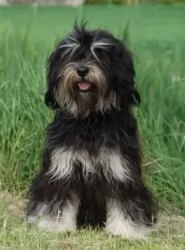 Ancestors of the Cao da Sera de Aires were used for herding livestock in the Serra de Aires and Alentejo, Portugal. This herding dog is native to Portugal and throughout the 20th Century he was kept as a working dog.
Ancestors of the Cao da Sera de Aires were used for herding livestock in the Serra de Aires and Alentejo, Portugal. This herding dog is native to Portugal and throughout the 20th Century he was kept as a working dog.
Known also as the Portuguese Sheepdog, Portuguese Shepherd Dog or Serra de Aires Mountain Dog, there are some questions surrounding the breed's ancestry as there are few records of dogs before 1900. The dog is thought to be related to the Pyrenean and Catalan Sheepdogs and that it has descended from Briards which were imported into Portugal and crossed with the Pyrenean Sheepdog.
The Cão da Serra de Aires breed standard was accepted by the Portuguese Kennel Club, and the breed was recognized internationally in 1996. The dog was also recognized by the United Kennel Club in the Herding Group in 2006.
 The Braque Saint-Germain, also known as the St. Germain Pointing Dog, is a French creation. The French pointing dogs and the English pointing dogs were mixed to develop the Braque Saint-Germain. He is a versatile hunting dog that was both a pointer and a gun dog. They are medium to large in size and went from being bred by royalty in the 1830’s to a popular everyday hunting dog. The ancestry of the breed can be traced back many additional centuries.
The Braque Saint-Germain, also known as the St. Germain Pointing Dog, is a French creation. The French pointing dogs and the English pointing dogs were mixed to develop the Braque Saint-Germain. He is a versatile hunting dog that was both a pointer and a gun dog. They are medium to large in size and went from being bred by royalty in the 1830’s to a popular everyday hunting dog. The ancestry of the breed can be traced back many additional centuries.
As popular as the Braque Saint-Germain was as a hunter, he gained his notoriety in the show ring. The first time a Braque Saint-Germain entered the ring in 1863 it was an acclaimed breed and upstaged all other pointing breeds. The French Braque Saint-Germain club was opened in 1913 and recognized by the Federation Cynoloqique International (FCI) and in 2006 was recognized by the North American United Kennel Club. Their popularity has risen and fallen since World War II. It has flirted with extinction more than once. Today’s Braque Saint-Germain is a highly talented hunting dog with a standard appearance that still does well in the ring.
The English Pointer was a cross between the hound dogs, British gundog, Spanish Pointer and herding breeds. This made the English Pointer a very versatile breed before it was crossed with the Braque Francais Gascogne. The Braque Francais Gascogne itself is believed to have developed from the Chien d-Oysel and Italian and Spanish pointing dogs. The English Pointer was specialized in pointing and the French Braque Francais Gascogne was a very versatile dog. In the Braque Saint-Germain the dog world has a versatile, excellent pointing dog.
In the 1800’s the French Crown was gifted with two English Pointers that were great at hunting. Some considered the English Pointers to be better than any of their Braque Francais. The female of these two pointers was bred many times but the male died without breeding. The female’s first litter was with a brown German Spaniel and were of low quality. Her second litter however was with an outstanding bird dog and produced 7 excellent puppies. Because of this these two dogs were bred several more times. The owner of the adult dogs moved to Saint-Germain, where their appearance attracted many hunters. The breed flourished here and was named the Braque Saint-Germain.
Soon corrupt individuals sold non-purebreds as Braque Saint-Germains and handlers showed these dogs under the Saint-Germain name. There are always dangers when a popular breed’s beginnings comes from only two dogs. In 1913 the new breed club fought over the standard and ended up producing two types. The first type was a sturdy dog with long ears and a round chest. He was larger and slower than his cousin. The second type was a smaller dog with a finer skeleton and short, high set ears. He was a galloper to his cousin’s trot.
The breed found itself facing near extinction in 1914 and during all of World War I. Dogs were not bred and many were not properly cared for. The breed became quite rare. Then as it began to recover, the Second World War intervened and devasted the breed again. By the end of the war, they were once again very rare and on the edge of extinction. It took a dedicated effort from local breeders to bring the breed back. By the 1950’s the two types of Braque Saint-Germain dogs were molded into only one breed. There remained a conflict between those that bred show dogs and those that bred hunting dogs.
Slowly the breed grew in number and in the late 1990’s there were over 100 puppies registered into the club every year. More than 100 were entered into the clubs in 2009. There have also been a few English Pointer crosses allowed to breed with the Braque Saint-Germains in order to grow and improve the gene pool. Still the breed is exceedingly rare outside of France. Through it all the breed has been able to maintain its place in confirmation and still be a versatile hunting dog.
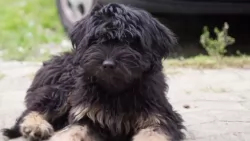 The beautiful Cão da Serra de Aires is a medium-sized dog. He stands at 45 to 55 cm at the withers and weighs about 17 to 27 kg. He is recognizable by the long, shaggy, single-layer coat, of straight or slightly wavy hair. Don’t be deceived by the coat as below, the dog has a muscular, athletic body.
The beautiful Cão da Serra de Aires is a medium-sized dog. He stands at 45 to 55 cm at the withers and weighs about 17 to 27 kg. He is recognizable by the long, shaggy, single-layer coat, of straight or slightly wavy hair. Don’t be deceived by the coat as below, the dog has a muscular, athletic body.
The coat comes in different shades such as fawn, gray, yellow and black. The dog has a long tail which is held straight out or down and he has medium-length, floppy ears. You’ve got to look hard, as the facial features of the dog are hidden by its shaggy coat. He has a lot of facial hair that sometimes you have to wonder if he can see out of his eyes.
The Cao da Serra de Aires is a wonderful canine companion and is devoted and loyal, forming strong bonds with their human family. He is a playful, amicable dog and gets on well with children in the home as well as with other pets.
He is intelligent and trainable, and when properly trained and socialized,he becomes an even nicer pet to have around and is obedient to his master’s voice. He is territorial, strong willed and dominant and makes a good watchdog too.
 The Braque Saint-Germain is very much a pointer and yet is a very attractive dog. They have a medium build, drop ears and a long, level tail tapered at the end. They are really distinctive looking with an athletic, lean, muscled look. The skull is round and the muzzle is the same length as the skull. Their nose is pink , their lips cover their lower jaw and their eyes are golden, round and large. The ears are set high on the head and look like they are slightly detached. The neck is long, muscular and arched, while they have deep chest. They are well proportioned, good looking dogs with a friendly facial expression. Their coat is true to the pointing dog group as it is short, smooth and white with orange markings. Dogs of any other color might be great hunting dogs but are not show dogs and should not be bred
The Braque Saint-Germain is very much a pointer and yet is a very attractive dog. They have a medium build, drop ears and a long, level tail tapered at the end. They are really distinctive looking with an athletic, lean, muscled look. The skull is round and the muzzle is the same length as the skull. Their nose is pink , their lips cover their lower jaw and their eyes are golden, round and large. The ears are set high on the head and look like they are slightly detached. The neck is long, muscular and arched, while they have deep chest. They are well proportioned, good looking dogs with a friendly facial expression. Their coat is true to the pointing dog group as it is short, smooth and white with orange markings. Dogs of any other color might be great hunting dogs but are not show dogs and should not be bred
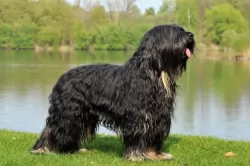 The Cão da Serra de Aires is such a loyal dog to his human family that he makes a splendid pet. He is active, having worked historically at herding and guarding.
The Cão da Serra de Aires is such a loyal dog to his human family that he makes a splendid pet. He is active, having worked historically at herding and guarding.
Socialization and obedience training ensure that he becomes an exceptional pet and he has a host of positive attributes to his name – he is intelligent, energetic, loyal and loving. He may have been used long ago to guard livestock, but today he is selected as a pet specifically for his excellent companionship and for his protective nature.
 The Braque Saint-Germain is a working dog and a show dog. They are energetic, competitive and driven. They are generally affectionate, loyal and love to cuddle with their people. They need human companionship companionship and can have severe separation anxiety when left by themselves. They love being a member of the family with children, but they are likely to knock very young children down unintentionally.
The Braque Saint-Germain is a working dog and a show dog. They are energetic, competitive and driven. They are generally affectionate, loyal and love to cuddle with their people. They need human companionship companionship and can have severe separation anxiety when left by themselves. They love being a member of the family with children, but they are likely to knock very young children down unintentionally.
The Braque Saint-Germain is a loyal, gentle breed and some might even be shy. They are not guard dogs. They are much too friendly toward strangers. Even though they were bred to point and track small game, they can be socialized to be safe living with smaller pets such as cats. They are intelligent, fast learners who love to learn. They also love to work and work long hours without fatigue. They will love to be a jogging or cycling partner.
They do best with large yards, rural areas or in hunting packs. They are not small apartment, city dwellers. They do get along with strangers and other animals. They will warn of strangers, but they are not aggressive.
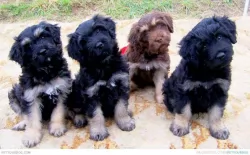 As with most dogs that are looked after well, their health can be good. The Cao da Serra de Aires isn’t likely to keep you at the vet often. Just like with any good dog, there are some health disorders that can benefit you to know about.
As with most dogs that are looked after well, their health can be good. The Cao da Serra de Aires isn’t likely to keep you at the vet often. Just like with any good dog, there are some health disorders that can benefit you to know about.
Being forewarned , you can get your pet to the vet quickly before the illness gets out of hand.
There are some pet owners who want to have their pets tested by the Orthopedic Foundation for Animals as well as the Canine Eye Registration Foundation to rule out health defects such as hip dysplasia and cataracts before they manifest themselves in their pets. This is of particular importance to breeders so as to prevent the parent dogs passing bad genetic conditions to the puppies.
This is a common skeletal disease where the dog’s hip joints don’t develop properly. It can be terribly painful for your pet to get around. It’s a genetic condition and while it is more prevalent in big dogs, any breeds are susceptible.
Your dog will battle along with painful joints and sometimes his hind-end will be lame. You’ll notice that once lying down, he battles to get up again. Fortunately vets are well acquainted with this ailment and they have different options to treat and manage it.
Cataracts in your dog come about from a disease process which affects the lens of the eye. The eye loses its transparency and impairs vision. There are some instances where cataracts can cause blindness. You’ll see a whitish gray area in your pets eye. The most common cause of cataracts is genetics. Get your pet to the vet who will do certain tests to evaluate the eyes and make a recommendation.
 The breed has very few health issues even with all the cross breeding followed by inbreeding. Due to the small gene pool there might be some genetically inherited problems. Due to the size of the gene pool, they might suffer from “founder’s effect” where if one dog has a certain condition, their descendants could also. Not enough research has been done to know if this is the case with the Braque Saint-Germain of not.
The breed has very few health issues even with all the cross breeding followed by inbreeding. Due to the small gene pool there might be some genetically inherited problems. Due to the size of the gene pool, they might suffer from “founder’s effect” where if one dog has a certain condition, their descendants could also. Not enough research has been done to know if this is the case with the Braque Saint-Germain of not.
Some of the potential health issues that the3 Braque Saint-Germain might face include:
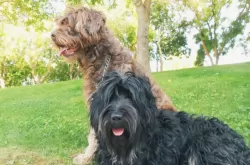 As a working dog used to long hours of action, the Cao da Serra de Aires will need lots of activity. He’ll need you taking him for long walks and playing ball games with him. He can become frustrated and destructive when left without any physical stimulation.
As a working dog used to long hours of action, the Cao da Serra de Aires will need lots of activity. He’ll need you taking him for long walks and playing ball games with him. He can become frustrated and destructive when left without any physical stimulation.
The Cao da Serra de Aires may have long hair but he isn’t high maintenance. He won’t require professional grooming, but will require a good brush a least twice a week. This is because the long coat can tangle.
To keep him looking his best, you’ll want to be trimming the hair around his paws. Another important grooming task is checking his ears and cleaning them. You have to be careful about cleaning your pet ears if you don’t know how, as it could damage the ears. Your vet can always advise you on how this is done.
 This is a working dog that can run and track for miles. She needs good nutrition. Feed about 3 cups per day in one or two meals. Two meals are preferred.
This is a working dog that can run and track for miles. She needs good nutrition. Feed about 3 cups per day in one or two meals. Two meals are preferred.
As previously mentioned this breed might be susceptible to many genetic diseases or disorders but there have not been any studies to show this.
The Braque Saint Germain does not need a high amount of exercise as their energy level is medium. They still need daily exercise. They do best with a fenced off leash area to run. They love frisbee and chasing balls.